
Newsletter of the
INTERNATIONAL ENVIRONMENT FORUM
Volume 17, Number 12 --- 15 December 2015
Website: iefworld.org
Article submission: newsletter@iefworld.org
Deadline next issue 13 January 2016
Secretariat Email: ief@iefworld.org General Secretary Emily Firth
Postal address: 12B Chemin de Maisonneuve, CH-1219 Chatelaine, Geneva, Switzerland
Download the pdf version
From the Editor, Request for information for upcoming newsletters
This newsletter is an opportunity for IEF members to share their experiences, activities, and initiatives that are taking place at the community level on environment, climate change and sustainability. All members are welcome to contribute information about related activities, upcoming conferences, news from like-minded organizations, recommended websites, book reviews, etc. Please send information to newsletter@iefworld.org.
Please share the Leaves newsletter and IEF membership information with family, friends and associates, and encourage interested persons to consider becoming a member of the IEF.
Report on IEF Participation in the UN Climate Change Conference, Paris, December 2015
This is a short version of the report at https://iefworld.org/cop21 which includes links to presentations.
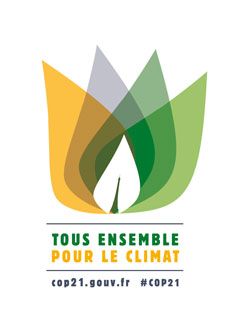
The United Nations Climate Change Conference (COP21) in Paris, France, on 30 November-12 December 2015 was launched by 150 Heads of State and Government to adopt a legally-binding agreement on the reduction of greenhouse gases necessary to prevent dangerous climate change. The conference successfully concluded with the adoption of the Paris Agreement by 195 states on 12 December. It is available at http://unfccc.int/resource/docs/2015/cop21/eng/l09r01.pdf and will be formally signed on 22 April 2016.
There were two parts to the conference on the same site at Le Bourget in the suburbs of Paris. Some 20,000 delegates and observers were accredited to the Conference of the Parties (COP) to the UN Framework Convention on Climate Change (UNFCCC) where the negotiations took place and where associated side events were organized to inform the delegates. Next door, the French Government created a Climate Generations area where 10,000 members of the public and representatives of organizations not accredited to the conference discussed the issues and considered possible solutions. There were stands for civil society organizations, research centers and local governments; forums for indigenous peoples and biodiversity conservation; projections of films; and conference rooms for organizations to hold events, present panels of speakers on relevant themes, and debate the issues before the conference. Many official delegates also participated.
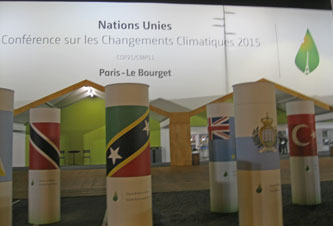 .
. 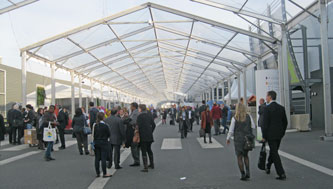
Entrance to COP21 at Le Bourget; central avenue in the Blue Zone
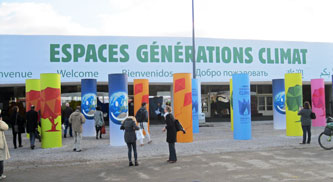 .
. 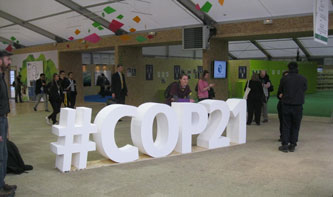
Climate Generations Area for civil society and the public
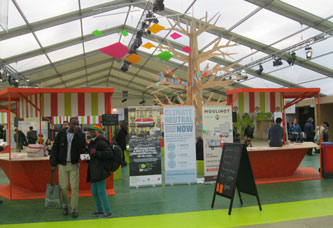
The Baha'is were able to have two accredited delegates to the conference (one split between the two weeks), including two board members of the International Environment Forum (IEF), Peter Adriance and Arthur Dahl, as well as Serik Tokbolat, representative to the United Nations in New York for the Baha'i International Community. The IEF delegation to the civil society part of the conference included Arthur Dahl of Switzerland, President of IEF, IEF Governing Board members Sylvia Karlsson-Vinkhuyzen (Netherlands), Victoria Thoresen (Norway), and Peter Adriance (USA), and Alessia Freddo (Italy/UK), Janot Mendler de Suarez (USA), Mojgan Sami (USA), Valeria Svart-Gröger (Germany/Moldova), Temily and Barak Tavangar (Malaysia/Hong Kong), Ismael Velasco (United Kingdom) and Onno Vinkhuyzen (Netherlands). IEF member Minu Hemmati was part of the German delegation. A video of the BIC/IEF delegation to COP21 is at https://youtu.be/28tUVudNLA4.
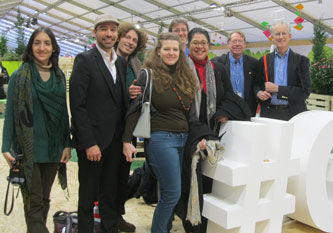 .
. 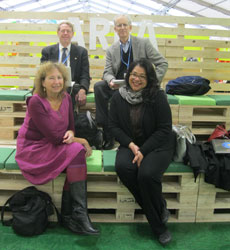 .
. 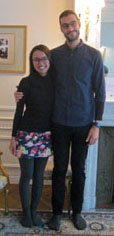
Valeria, Ismael, Valeria's husband Julian, Alessia, Sylvia, Mo, Arthur, Peter; Victoria, Arthur, Peter, Mo; Temily and Barak
The Baha'i International Community (BIC) prepared a highly-relevant statement for the conference: "Shared Vision, Shared Volition: Choosing Our Global Future Together. A statement of the Bahá'í International Community to the United Nations Climate Change Conference in Paris, France" which we distributed at the conference (see below). It is available at https://www.bic.org/statements/shared-vision-shared-volition-choosing-o…. On 14 December the BIC issued a press release on the results of the conference at https://www.bic.org/news/paris-climate-change-conference-movement-towar….
Equity and Justice
The Baha'i Community co-sponsored a side event on Saturday 5 December, at the intergovernmental conference on "Examination of how nations have and should consider equity and justice in setting INDCs" (Intended Nationally Determined Contributions to reduce greenhouse gas emissions). It examined how nations have and should set INDCs on the basis of justice, and the role of contrarian obstruction, and recommended a mechanism to assure that nations set INDCs on the basis of their fair share of safe global emissions.

The session, moderated by John Dernbach, Widener Law School, considered the role of ethics, justice and faith-based positions in relation to countries’ Intended Nationally Determined Contributions (INDCs).
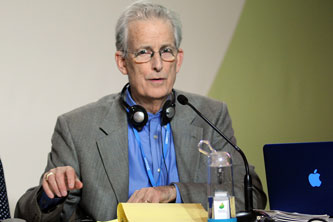
IEF board member Peter Adriance of the U.S. Baha'i Office of Public Affairs opened the event with a presentation on the importance of an ethical approach based on equity and justice in governmental decision-making. He spoke on the presence of faith communities in the climate change negotiations, and called for empathy towards other people when developing INDCs, stressing that “we are a single people on a single planet.” He pointed to statements from several faith leaders in the past year on the relationship between people and the Earth, underscoring that 80% of the global population profess a faith.
In discussions, participants considered, inter alia; opportunities for faith-based organizations to influence climate narratives; UNFCCC language and opportunities for ethical language in the agreement; and the place of the principle of common but differentiated responsibilities in the discussion of ethics.
Source: IISD Reporting Services http://www.iisd.ca/climate/cop21/enbots/5dec.html#event-7
Community Resilience
The first International Environment Forum event in the Climate Generations area was also on 5 December on the topic "Community resilience in the face of climate-driven extreme events, a Vanuatu case study". The event was chaired by Ismael Velasco of the Adora Foundation (UK) who introduced the panelists and moderated the discussion with the audience. The event was publicized on the International Council of Science listing of science events at COP21 (as were all the IEF events), and the room for 50 was full to overflowing.
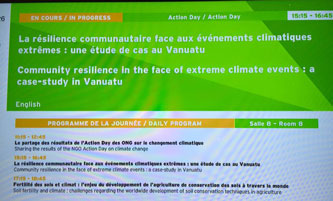 .
. 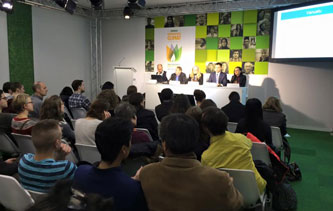
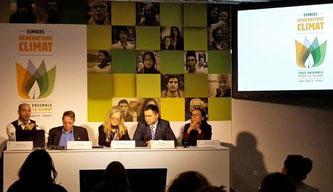
Dr. Arthur Dahl, President of IEF, founding Coordinator of the Secretariat of the Pacific Regional Environment Programme (SPREP) and former advisor to the Government of Vanuatu, summarized the importance for climate change adaptation of local community resilience in helping people to cope with the increasing number of natural disasters linked to or intensified by climate change. He then presented a case study of the experience of the Baha'i community on the island of Tanna, Vanuatu, after being hit by cyclone Pam in March 2015, describing the force of the level 5 cyclone that passed over the island destroying almost all its infrastructure. A 10 minute video projection about the Baha'i community experience during and immediately after the disaster showed the importance of social cohesion and solidarity in building community resilience in recovering from such extreme events.
Dr. Serik Tokbolat, Representative of the Baha'i International Community to the United Nations, New York Office, discussed the tools used by the Baha'is for building social cohesion at the rural village level, and more broadly in communities and neighbourhoods that are often vulnerable to extreme climate events. These included study circles to build individual and group capacity, educating children in values and virtues, helping pre-adolescents to take responsibility for acts of service to the community, and devotional gatherings for people of all faiths and no faith to strengthen unity in spirituality. Capacities for collective decision-making and administration are also important. He provided an example from Bihar in India where women were empowered and the caste system left behind.
This was followed by a presentation by Janot Mendler de Suarez of Boston University, Technical Advisor to the Red Cross/Red Crescent Climate Centre, who summarized academic studies of the characteristics of successful community solidarity that were exemplified in the Vanuatu case study. Her presentation included a video clip of the President of the Red Cross/Red Crescent in Togo discussing the importance of community resilience.
The panel concluded with Temily Tavangar, a doctoral student at the University of Hong Kong, who provided a recent example of a town in Malaysia hit by the worst flooding in its history. The trauma of this natural disaster created the opportunity for a few local Baha'i families to organize first some devotional meetings for their neighbours to find some spiritual reinforcement. Discussions of the needs of the community followed naturally, leading to actions to clean up the neighbourhood after the flood, and finally to a decision to buy a boat to be ready to help each other in the next flood.
WEEK TWO
Monday and Tuesday of the second week of COP21 (7-8 December) were primarily devoted to networking. Peter Adriance participated in a number of interfaith activities. Other members of the IEF delegation followed different side events out of the many hundred taking place, with a daily meeting of those members available over lunch to share experience.
Among the side events of interest to IEF was a session on the credibility of national actions organized by the London School of Economics and Political Science, which has just published a report on the subject. Sir Nicholas Stern stated that government-induced policy risk is the most important deterrent to investment, and cited a number of actions that enhanced credibility, such as establishing legal structures, rules and procedures, and strong organizations, as well as good past performance. Confidence in the Paris agreement would depend on trust, mechanisms for racketing commitments, and adequate investment. This topic related closely to the IEF events on accountability.
Another event was on Accelerating the Great Transformation: the Post-Paris Script. Hans Joachim Schellnhuber, director of the Potsdam Institute for Climate and advisor to Pope Francis on his recent encyclical, first summarized the climate challenge, with 2015 by far the warmest year ever with 0.1°C of warming. He described the major tipping events, with coral reefs lost at less than 2°C of warming; the Arctic summer ice, Alpine glaciers and the Greenland ice sheet lost if we go over 2°C. 4°C of warming would see the loss of the West Antarctic Ice Sheet, the Amazon forest, boreal forests and the Sahel, while 6-8°C of warming would mean the end of permafrost, Arctic winter sea ice, and the East Antarctic Ice Sheet, with the sea level rising 50 meters. The Gulf region could become uninhabitable, with daily temperatures reaching 60°C. A great transformation is obviously required. He described the innovations that could make such a transformation possible, and concluded that this was a moral issue, for which we needed to bring together reason and faith.
A second speaker in this event was Dirk Messner, who discussed decarbonizing the economy. He said that ever since the Limits to Growth report in 1972, it has become increasingly clear that it was necessary to overcome the old system, and a new model is in fact emerging and acquiring legitimacy. Evidence for this includes the IMF report on fossil fuel subsidies ($5.3 billion/year or 6.5% of global GDP), the Pope's encyclical and President Obama's recent speech, the fact that 2015 saw more investment in renewable energies than in fossil fuels, the disinvestment decisions of Norway, Stanford University, the Rockefeller Fund and Allianz, and the G7 declaration on decarbonization. We may be approaching a tipping point towards decarbonization. We can scale up the process by including (1) decarbonizing efforts beyond renewable energy infrastructure, such as in city planning, mobility systems and carbon efficiency, (2) private action towards decarbonization, (3) comprehensive multilateralism with groups of countries ready to move faster, as well as cities, research networks, and linking emission trading schemes, and (4) the combination of politics, innovation and investment for a civilizational shift, which would be a cultural challenge and require a moral revolution.
Accountability after Paris
On Wednesday 9 December, IEF board member Sylvia Karlsson-Vinkhuyzen put together a side event on Accountability after Paris in the Netherlands Pavilion at the intergovernmental conference, organized by Wageningen University Public Administration and Policy Group, and co-sponsored by Climate Strategies, One World Trust and the International Environment Forum. The Moderator was Robert Whitfield, chair of the One World Trust.
Beyond the emissions pledges made by different countries, a cornerstone for ensuring the effectiveness of the 2015 international climate change agreement will be the mechanisms in place to hold states to account for how they live up to their commitments. This seminar reviewed the different pathways through which such accountability can be achieved, within and beyond the international regime.
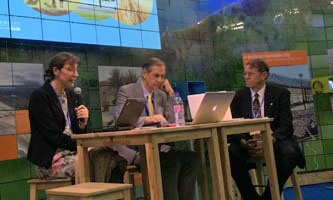 .
. 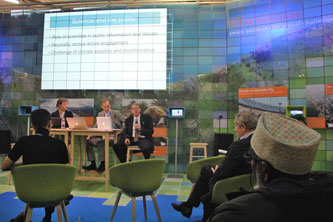
Four pathways for accountability – challenges and opportunities
The first speaker was Dr. Sylvia Karlsson-Vinkhuyzen, assistant professor Public Administration and Policy at Wageningen University, adjunct professor global environmental governance Helsinki University and member of Climate Strategies. She spoke on "Four pathways for accountability – challenges and opportunities".
She said it is clear that countries have not promised enough in Paris, and are not yet doing their fair share. How do we ensure the accountability of states after Paris, both for the level of ambition in their present and future commitments, and how they comply with them? Accountability is about who holds an actor to account, how, about what and with what effects. States will sign the Paris Agreement, so there are four categories of actors who should hold them to account: the governments of other countries, national institutions, national and global publics, and the governments themselves.
Review by other countries should be part of the Paris Agreement, including procedures for how countries will report on their implementation, how those reports are scrutinized, and if there are consequences for countries failing on their promises.
Countries are willing to some degree hold each other to account collectively for the global targets they have set, but by no means individually. It is not yet clear whether peer accountability mechanisms contribute to higher ambition in commitments and/or compliance.
National institutions often provide better opportunities for holding governments to account than international mechanisms. These will naturally vary according to a country’s political and legal system. Domestic accountability mechanisms have higher potential to be strong if commitments become incorporated into domestic law, as this usually enables a number of judicial, political and administrative procedures. Parliaments in many political systems have the role to hold their executive governments to account for their actions, but this accountability relationship is particularly weak around issues of foreign affairs and global governance.
Other categories of national institutions that can take on a role in national accountability are courts, when international agreements have been internalized in domestic laws, and independent national audit institutions.
The public, both national and global, is a potentially powerful route to hold governments to account, and their involvement would strengthen the public and democratic accountability of climate governance. Domestic publics can review their own governments through domestic debate in the media and other social spaces. A global public can work through expert non-governmental organizations (national or international) and sometimes through broad social movements such as social media and demonstrations.
This is the one route through which people can raise their voice and hold governments beyond their own borders to account for the actions that influence them. However some governments are less open to and sensitive to views of the public.
Finally, governments may look themselves in the mirror regularly and establish processes for making sure they are on track to implement what they have promised. For example, governments can assign clear responsibilities for implementation to relevant ministries, government agencies and provincial and local authorities, making it easier to hold governmental actors to account. The UK Climate Change Act sets a target of 80 percent emission reductions by 2050, which are linked to five-year carbon budgets for the shorter term. These carbon budgets are allocated to different government departments in line with their own share of emissions from the public sector as well as the economic sectors they seek to influence. Each department needs to publish plans for how to achieve these reductions, and monitor and report on progress.
Each of these pathways has a limited potential to keep governments focused on increasingly bold climate actions. It is clear that we need all of them, with each strong and mutually supportive of the others, backed by public opinion.
The Role of Science in Accountability
Dr. Arthur Lyon Dahl, President of the International Environment Forum, then discussed the Role of Science in Accountability. He noted that the whole issue of climate change is a science-driven process. The IPCC is the formal mechanism to link science to the UNFCCC and diplomatic processes. This is and needs to be scientifically conservative, with its summary reports approved by governments.
There is also a broader role for science in accountability. The climate system is evolving so rapidly that the long delay to peer reviewed consensus means that many early warning signals are disregarded. These issues need to be openly debated in the scientific community and brought to the attention of governments and the more formal science-policy processes. We need clear mechanisms to deal with risk and probability.
There are issues about the role of scientists in public information and debate. Some scientist prefer neutrality, providing the data but not commenting on their use. Others feel that scientists should be actively engaged in the public debate and public education about the issues. Then there is the challenge of climate skeptics and disinformation, discrediting science in the defense of vested interests.
Science-based indicators can play an important role in holding governments accountable by rating and ranking them. The data may come directly from monitoring and assessment, such as of CO2 concentration in the atmosphere, sea ice extent, national emissions, etc. These can be used to derive indicators and indices. Good examples from the field of sustainability are the ecological footprint, the Environmental Sustainability Index, the Environmental Performance Index, etc.
Finally, there is the role of science-based non-governmental organizations (NGOs). The social sciences can do work on what is needed for behavior change towards sustainable lifestyles. Organizations like the International Environment Forum treat the interface between science and ethics and ethical accountability. Scientists can also provide advice to other processes and stakeholders, such as with the team that contributed to the drafting of the Pope's recent Encyclical.
Personal and professional accountability: an ethical challenge
The final presentation was also by Arthur Dahl, on "Personal and professional accountability: an ethical challenge". He provided reflections on the role of a personal approach to accountability and responsibility among decision-makers and civil servants.
Principles for accountability for climate change agreements
On Thursday 10 December, while the diplomats were trying to find consensus on the remaining outstanding issues in the Paris Agreement on Climate Change, the IEF held its second event in the Climate Generations area on "Principles for accountability for climate change agreements". Signing an agreement is only the first step in going from policy to action. Experience is now showing that agreements need to be accompanied by processes within a well established governance framework to hold parties accountable for implementing the commitments made and decisions taken. Accountability can take various forms, internal or external, by peers or the general public, with statistics or qualitative measures, with different levels of effectiveness. This panel explored and compared different forms of accountability as they may relate to climate agreements and to targets presented by countries in Paris. The chairperson was Peter Adriance, Representative for Sustainable Development of the U.S. Baha'i Office of Public Affairs, and the room quickly filled to overflowing.
 .
. 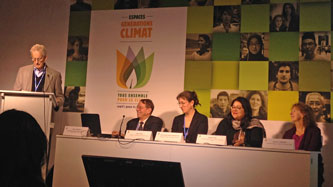
Principles - the ethical foundations for accountability relationships
The opening speaker was Prof. Sylvia Karlsson-Vinkhuyzen of the Public Administration and Policy Group, Wageningen University, Netherlands, on the topic "Principles - the ethical foundations for accountability relationships". She unpacked the dimensions of accountability: who is accountable and to whom? about what? how? by what standards? with what effects? States are accountable for the Paris Agreement, but they cannot do everything, so many other actors must take up some responsibility. The first "who?" in this case is states who need to be kept on track with their commitments. For this there is peer accountability, domestic institutions such as parliaments and courts, and self-accountability. The "what?" after Paris includes the INDCs and their future updates, but also everything in the UNFCCC, including climate change education, for example. For other actors, they may follow laws set by the government, or ethical standards. The "how?" may depend on public processes and internal government mechanisms, as well as reports by countries under the convention which are reviewed by other states. The spirit in which action is taken is also important, either negative or positive and encouraging. There are different standards for accountability, whether following others or becoming leaders, whether shaming or encouraging.
The Policy Paradox
Dr. Mojgan Sami of the University of California Irvine Program in Public Health gave a very dynamic presentation on the Policy Paradox, that we too often address the symptoms of a problem rather than the underlying causes.. She cited the U.S. Civil Rights Act of 1964 that outlawed all discrimination, yet discrimination is still a major problem in America today. So she asked what is the problem that COP21 is trying to solve, a root cause or a symptom? Politics looks for causes mostly to assign responsibility for problems. We need to redefine accountability. Climate change is not a “technical” issue, but a moral imperative. Money is not the answer. Development discourses must address extreme poverty and wealth, yet we seldom talk about the latter. She listed some principles of accountability:
• Resilience
• Prevent harm to planet and people
• Cultivate capacity for action in multi-sector, interdisciplinary and cross movement spaces
• Expand understanding of human nature and cultivate latent capacities
• Support regional and local economic systems.
Finally she said we must be accountable to one another, and concluded with a quote from the Baha'i Writings: “Let your vision be world embracing rather than confined to your own self.”
Implementing Commitments
The next presentation was by Prof. Victoria Thoresen of Hedmark University College, Norway, and UNESCO Chair for Education about Sustainable Lifestyles, on "Implementing Commitments". She warned about juridification, the tendencies of law to replace informal means of structuring relations and activities by more formal, law-like approaches. While juridification can be positive, such as when notions of justice are imported into resolution of disputes, it can also lead to increasing bureaucratization and complexity, in which the individual is ultimately rendered less capable of protecting his or her own interests. The State does not necessarily have a monopoly on governance approaches or activities, and there are an increasing number of imaginative approaches to voluntary governance with public-interest-oriented dimensions. She quoted Sir Percy Nurun (1920): “Individuals are never more themselves, never more masters of their own fate, than when they recognize that they are a part of a greater whole from which they can draw inspiration and strength, and to which they can give inspiration and strength.”
She described the processes leading to increased accountability. A thorough analysis of human nature and existing social structures and systems, retaining confidence in human’s "propensity for good" despite evidence of greed, egotism, injustice and hate, should lead to identification of the basic principles and values leading to the "Future we want". The underlying material and spiritual principles of existence include connectivity and cohesion (a power of attraction), transference and transmutation (processes of change and augmentative power of growth), and finiteness (recognition of mortality and the existence of immortality). Empathy is a key value for social integration, and trustworthiness is essential for the stability of every affair. We need ongoing investigation of the consequences of present habits and aspirations (scientific, social and personal), leading to a constant process of social learning in homes, schools, local communities as well as regionally and globally. We also need reflection on actions and promoting a willingness to adjust and change (voluntary codes of conduct and practice like ISO 2600) and improved infrastructure which supports change (preventative regulations, laws, penalties).
1. Education can only help allay a threatening condition by addressing root causes.
2. Climate change education needs to happen within interdisciplinary frames.
3. There can be no ethical and adequately responsive climate change education without global climate justice education.
4. The educational response to climate change needs to be both local and global.
5. Wherever it takes place, climate change education needs to be a social and holist learning process.
6. There is a need for educators to urgently and radically think through the implications of the invisibility and uncertainty of climate change. (David Selby and Fumiyo Kagawa, Education and Climate Change, Routledge 2010, p.241-243)
She closed with a quote from the Baha'i International Community "Broader visions of human purpose and prosperity are moving from the periphery to the center of public discourse. It is becoming clear that the pathway to sustainability will be one of empowerment, collaboration and continual processes of questioning, learning and action in all regions of the world.” Paradigm shift to a new culture of accountability will require new social norms and practices.
Personal and Professional Accountability: An Ethical Challenge
Dr. Arthur Dahl, International Environment Forum, Switzerland, and retired senior UNEP official, repeated for this different audience the presentation he gave yesterday on "Personal and Professional Accountability: An Ethical Challenge" which is available at https://iefworld.org/ddahl15h.
This was followed by a lively discussion that continued in the corridors long after the end of the session.
Values-based climate change education
On Friday 11 December, the last day of COP21, the IEF organized its last event on Values-based climate change education (Education pour le changement climatique sur la base des valeurs; Educación para el cambio climático basada en los valorous) in the Climate Generations area. The panel, chaired by Janot Mendler de Suarez, Visiting Research Fellow at the Boston University Pardee Center for the Study of the Longer-Range Future, shared experiences in values-based education for responsible living to motivate adjustments in mindsets and behavior individually and in communities. An audience of about 70 people crowded into the room meant for 50.
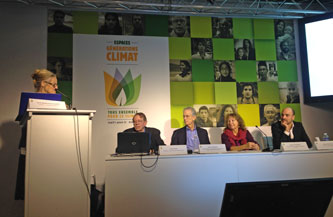 .
. 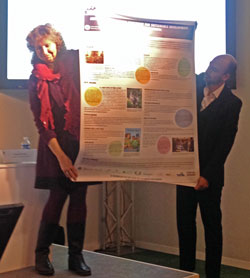
Values-based Education for Climate Change
Prof. Victoria Thoresen of Hedmark University College, Norway, Director of the Partnership for Education and Research about Responsible Living (PERL) and UNESCO Chair for Education about Sustainable Lifestyles, opened the session with a presentation on "Values-based Education for Climate Change". She described the “value/action gap”, a disparity between what people mean they value, say they value and how they actually implement these values in everyday life. Some issues in dealing with this include a lack of common language by which to discuss values, a lack of sufficient understanding about how values and core life skills relate to the complex and highly interconnected systems and processes that drive our lives, the traditionally “top-down” pedagogical approaches which are used when teaching values, and conflicting interests that are so deeply embedded in our market-controlled societies and reflected in our curricula that teachers are often at a loss as to how to deal with diverse values simultaneously. One approach is through participatory pedagogical approaches, such as the manual "Here and Now: Education for Sustainable Consumption" published by UNEP. The EU-funded project on Values-Based Indicators of Education for Sustainable Development (www.esdinds.eu) and its WeValue methodology also addressed this. The Dignity Principles are based on both ethics and enlightened self-interest. (www.globaldignity.org) LOLA: Looking for Likely Alternatives is a didactic process for approaching sustainability by investigating social innovation through one-on-one interviews, reports, exhibitions, etc. There are toolkits for teachers, and other materials available. The UNEP/UNESCO YouthXchange includes a toolkit, website and network of activities based on case-studies of alternative, sustainable products, services and ways of living (www.youthxchange.net).
She then discussed how values-based education influences actions, starting with a quote "We cannot segregate the human heart from the environment outside us and say that once one of these is reformed everything will be improved. Man is organic with the world. His inner life moulds the environment and is itself also deeply affected by it.“ (Shoghi Effendi, 1932). It stimulates a transformation of both our inner life and external conditions. It helps us become more fully human and achieving a dynamic coherence between material and non-material requirements of life. Students acquire an understanding of systems and processes, and gain insight into interconnections. They recognize that their understanding changes and grows, and that what they once thought was right may not always be so. They develop trust and compassion and inspire the capacity for service.
Values-based education fosters a vibrant community life in neighborhoods and villages, characterized by a keen sense of purpose. Global citizenship is not only personally responsible citizenship (how one leads one’s own life), nor merely participatory citizenship (how one interacts with others), but transformative citizenship leading to compassionate connectedness based on empathy, collective social learning, moderation and sharing.
Values-Based Climate Education: Cracking The Behaviour Change Challenge
The next presentation was on "Values-Based Climate Education: Cracking The Behaviour Change Challenge" by Ismael Velasco, Director of the Adora Foundation. He referred to the connection between values and behaviour, and the need to translate words into deeds. The goal of education for sustainable development (ESD) as defined by the United Nations Decade of Education for Sustainable Development is: “To integrate the principles, values, and practices of sustainable development into all aspects of education and learning. This educational effort will encourage changes in behaviour that will create a more sustainable future in terms of environmental integrity, economic viability, and a just society for present and future generations.”
He described the three components of values-based behaviour change: Information, motivation and behavioural skills, which combine to produce ethical behaviour. There are also three moderators of values-based behaviour-change interventions. The first is personal conditioning, including habits, beliefs and attitudes; competing priorities and affects; neurological functioning; and moral predispositions (cultural or innate). The second is situational conditioning, with priming effects and group effects. Third is institutional conditioning resulting from legal norms, the institutional climate, opportunity to practice, and institutional incentives and disincentives.
Behaviour balances between moral integrity and the values action gap, with integrity enablers including value-consonant conditioning, behavioural skills, moral affect and espoused values. Integrity inhibitors include value-dissonant conditioning, skill gaps, competing affects, and competing priorities.
Designing effective values-based climate education requires:
1. Evidence-based, values framed information
2. Priming: verbal and non-verbal
3. Affective/experiential multi-sensory group learning
4. Elicitatory reconceptualization
5. Personal application – service
6. Institutional accompaniment and support
7. Iteration
He concluded with a quote from the Baha'i sacred writings: “Whoso ariseth among you to teach… let him, before all else, teach his own self, that his speech may attract the hearts of them that hear him. Unless he teacheth his own self, the words of his mouth will not influence the heart of the seeker. Take heed, O people, lest ye be of them that give good counsel to others but forget to follow it themselves.”
Implementing Values-based Climate Change Education
The third presentation was by Dr. Arthur Dahl, President of the International Environment Forum, Switzerland, and a partner in the EU-funded project on Values-based Indicators of Education for Sustainable Development (ESDinds). He gave examples on "Implementing Values-based Climate Change Education", responding to the need for values in climate change education to motivate changes in behavior and reduce greenhouse gas emissions from consumption. The Paris Agreement will start us on the transition to a sustainable economy and society, but only a fundamental change in peoples' aspirations and lifestyles will allow us to meet the Paris commitments. Education will be the main channel for doing this. Beyond scientific knowledge and intellectual understanding of climate change and its impacts, values-based education is necessary to change behaviour.
This requires making the invisible visible through a process of crystalizing values, identifying values that encourage responsible and sustainable lifestyles, and reinforcing them. He summarized the approach developed during the ESDinds project (http://www.esdinds.eu/). It started with some values for which the project developed indicators: unity in diversity, trust/trustworthiness, justice, empowerment, integrity, and care and respect for the community of life (the environment). Case studies were conducted with a variety of groups, including a university sustainability programme in Mexico, a cosmetics company in Italy, a Red Cross youth programme for former child soldiers in Sierra Leone, a youth theatre group in Germany, and Moslem women in inner city London. A program of Echeri Consultores, Mexico, working with 9-13 year olds in 15 schools in the Purepecha indigenous communities, included arts workshops on environmental conservation and values; guided reflection on local ecosystems; and tree planting workshops, enabling the children to establish tree nurseries in the school grounds and conduct reforestation activities in the wider community. The values-based indicators developed with the help of Ismael Velasco enabled them to measure the empowerment of the children to improve their own environment.
This methodology was applied through the Partnership for Education and Research about Responsible Living (PERL) (http://www.livingresponsibly.org), directed by Victoria Thoresen, to produce values-based learning toolkits for secondary schools, for teachers, students and the school learning environment, which can be downloaded from IEF at https://iefworld.org/node/665. These address the foundations of sustainable lifestyles and responsible consumption, upon which climate change education can be built.
The International Environment Forum (IEF) has also prepared climate change courses for community use, in English and French. Scientific and Spiritual Dimensions of Climate Change is an interfaith study course of 9 classes for group study which is available on line at https://iefworld.org/ssdcc0.html. Its modules include Spiritual Reflections on Nature and Humankind, The Impacts of Climate Change, The Causes of Global Warming, Spiritual and Practical Dimensions, Climate Change Mitigation, Spiritual and Practical Dimensions – the Role of Society, Some More Climate Science, and A Challenge to All of Us. The French version, Cercle d’étude en 5 parties: Les dimensions scientifiques et spirituelles du changement climatique, is available on line at https://iefworld.org/ccFr0.
Another IEF initiative has been the development of courses for the Wilmette Institute, an on-line learning center of the Baha'is of the United States. The climate change course runs for 8 weeks, and covers: Nature and Humankind, Science of Climate Change, Impacts of Climate Change, Spiritual and Ethical Dimensions of Climate Change, Mitigating Climate Change, and A Challenge to All of Us. There is a complementary course on Sustainable Development and the Prosperity of Humankind (8 weeks), including: Introduction to the Concept of Sustainable Development; Economic Development and Sustainability: Poverty and Wealth; Social Development: Crises and Solutions; The Environmental Challenge and Bahá'í Approaches; Future Perspectives on the Prosperity of Humankind; Education for Sustainable Development: Individual and Community Action; and Integration and Application of Learning for Sustainable Development.
There is also an association in the USA called Full Circle Learning which has prepared a Climate Change Agents curriculum for schools which could be adapted to other countries and cultural contexts (http://www.fullcirclelearning.org/).
Moving Forward Together
The final presentation was by Peter Adriance, Representative for Sustainable Development in the U.S. Baha'i Office of Public Affairs, who described their interfaith work on climate change, and the resulting approach to climate change education. Values are interwoven with faith as well as psychology and sociology. In the U.S. Partnership for the Decade of Education for Sustainable Development, Peter led a faith component that looked at values for sustainability in action. It has become clear at COP21 that deep ethical and moral values are at the heart of the climate change problem. In the USA, in addition to the Wilmette Institute mentioned in the previous presentation, the Baha'is run three schools or retreat centers with programmes of education for sustainable development and climate change.
The aim is a deeper emotional connection with the environment, to address what has been called "nature deficit disorder", such as for city children who never have had contact with the natural world. Drawing on Joseph Connell's work on sharing nature worldwide (http://www.sharingnature.com/), they develop four stages of excitement, focusing, experience and reflection. For the junior youth or pre-adolescents, the experience is transformative. Those who had never been in the woods and had no desire to go there discovered a deep calm their chosen "magic spot" outdoors. The programme has grown into families as agents of change for a sustainable world, using selected quotations from the Baha'i writings that can be found on the IEF web site at https://iefworld.org/cmpchange. The content includes food and food systems, which are closely related to climate change, consumption and materialism (in a world with either too much or too little), justice, interconnectedness, and the oneness of humankind. There is also hands on learning through the arts, such as jointly painting a mural. In one exercise, a blindfolded participant is led to find and feel a tree, and then tries to go back and find it without the blindfold. The Baha'i writings include many allusions to nature, so discovering the reality of nature gives them new meaning. In another exercise, the "council of all beings", each participant selects one species (from a choice of 50), studies their profile and the impacts that climate change will have on them, creates a mask to become that species, and then speaks on behalf of that species in the council of all beings about climate change.
The event concluded with an experiential exercise led by Janot Mendler de Suarez in which each participant closed their eyes and imagined a place or a creature with which they felt a deep connection, chose words to describe their feelings, shared them with the group and joined with those with similar feelings to discuss what they had in common in their diversity.
The IEF team met regularly during the conference to share experience and plan for our events.
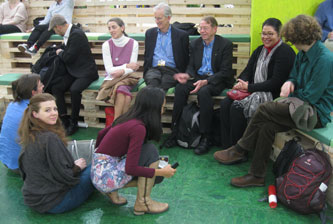 .
. 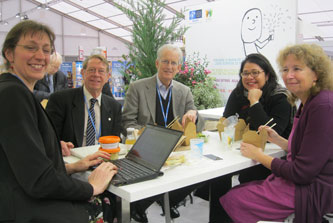
IEF team meeting; a working lunch with Sylvia Karlsson-Vinkhuyzen, Arthur Dahl, Peter Adriance, Mo Sami and Victoria Thoresen
In addition, IEF board member Peter Adriance was an official Baha'i delegate for the two weeks of the intergovernmental conference, with Serik Tokbolat of the Baha'i International Community as the second delegate for the first week and IEF president Arthur Dahl replacing him for the second week.
Comments from IEF participants at COP21
The Final Day of the Beginning
Blog by Sylvia Karlsson-Vinkhuyzen on the adoption of the conference outcome
12 December 11:40. The suspense is rising. I am sitting in the overflow room – one of the big plenary rooms where we can watch the action of the Paris Committee on screen. The meeting is scheduled for 11.30 but we do not know if there will ‘just’ be the announcement of the new and hopefully final text, or whether the Parties will be asked to approve it here, on the spot. Seeing US foreign minister Kerry in the room makes us expect the latter. Perhaps. Someone told me President Hollande was going to come. Rumours in your ears and on twitter. Let’s see what actually happens. Podium still empty but the room is filled up. Applauds as the minister of the high ambition coalition came in – including Brazil who reportedly joined in the last couple of days. And my neighbour just shows me the news item that Australia has also joined the coalition. Interesting. Later I see tweets Japan has joined. There is something about positive social pressure also in international cooperation.
It turns out to be a session of high emotions and speeches of unusual poignancy. COP President Fabius – announces the text will be available shortly after the session and calls on the delegates to consider the historic importance of approving it. Some extracts from my not perfect notes: “Today it is a moment of truth. Before you examine the text and before you, I hope, will approve it. This agreement is necessary for the entire world...it will enable islands to protect themselves...expedite financial means for durable development, serve food security, combat poverty, essential rights, and ultimately peace...we are citizens of the world”.
Following are speakers such as President Hollande, UN Secretary General Ban Ki-Moon and Ms. Christiana Figueres, Executive Secretary of the UNFCCC. You can listen yourselves http://unfccc6.meta-fusion.com/cop21/events/2015-12-12-11-30-comite-de-…
If there has ever been public moral pressure put on countries it was now. I wondered how after those speeches on the importance of this moment, of this Agreement for the world, any country could voice its opposition. And no one did. After about 7 hours where there had been a break for delegates to read the new text now translated to UN’s six official languages, and some delay where a few delegations seemingly wanted assurances on some things, the plenary reconvened. After reports of the committee appointed to check the legal language of the text had given its report, and the UNFCCC’s own legal expert had read a list of technical errors in the text that will be corrected in a revised text, President Fabius closed the Paris Committee, opened the COP and asked for adoption of the Agreement saw no objections and the gavel went down. Cheering, cheering, delegates standing applauding, simply celebration. It would not stop. After so many years of work for this by so many the relief was immense.
There was a spirit of common vision, of common volition in that room. Speaker after speaker celebrated this as a victory of multilateralism and a result of countries’ willingness to look beyond only their own interest toward that of humanity and the planet. Speaker after speaker credited the final success to the inclusive and transparent leadership of the COP President Laurent Fabius. One of the small island states said they had never before felt that they were heard in this way in the negotiations. The representative of another island exclaimed that he could go home with pride and face his country’s youth who had made 1.5 degrees as a goal their mantra. Of course the work has only started but this was perhaps the end of the beginning as a Swedish newspaper commentator put it.
I cannot take any credit whatsoever for this new historic step in global climate governance. Yet I witnessed first-hand the failure six years ago in Copenhagen and now feel honoured to have seen its birth and to be able to say to my children that I was there, in the room, on 12 December in Paris.
Comment from Ismael Velasco on the conference outcome
An amazing achievement from the point of view of the history of COP and the huge conflicting interests of the nearly 200 countries. A mere (and still hugely inadequate) start to the momentum necessary to do what is needed, which the declaration remains so far behind of. A symbolic victory, but I think a victory nonetheless. And symbols have a way of taking on a life of their own. I think Monbiot put it well:
"By comparison to what it could have been, it’s a miracle. By comparison to what it should have been, it’s a disaster."
I do feel more hopeful than him however, in terms of the wider momentum it generated beyond the COP21. The pledges from the largest multinationals, in terms of both emissions and renewable energies are a possible turning point, the gathering momentum of climate mobilisations that approached a million people last year, the gathering moral imperative, the simple rise of political goodwill and authentic negotiation as a global phenomenon, are all witnesses to a spreading, adaptive global consciousness racing against time. Combining that with the huge range of innovations and breakthroughs taking place in the technological sphere, I think it is fair to say we are likely to look back on this COP21 as a positive turning point or at least a milestone, particularly if we can, in between COPS, increase unilateral and multilateral action at the national and regional level, that could conceivably at some point overtake the COP commitments, not least under pressure of a growing electorate and popular wave. Of course if the follow-through fails to materialise, the catching up may come too late to overtake the forces of disintegration forcing us into hugely more painful scenarios.
But I do think it is fair to say the global fight for our planet has just received a promising injection of hope.
UNEP quotes BIC for COP21
The United Nations Environment Programme (UNEP) has quoted from the new Baha'i International Community (BIC) statement for the UN Climate Change Conference (COP21) in Paris.
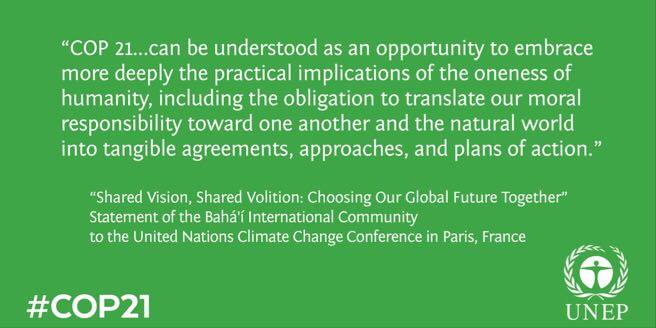
The full statement "Shared Vision, Shared Volition: Choosing Our Global Future Together" is at https://iefworld.org/bic_cop21 or https://www.bic.org/statements/shared-vision-shared-volition-choosing-o….
Science hasn’t convinced many leaders to act on climate. Can faith?
Seth Borenstein, Associated Press, CBC website
The cold hard numbers of science haven’t spurred the world to curb runaway global warming. So as climate negotiators struggle in Paris, some scientists who appealed to the rational brain are enlisting what many would consider a higher power: the majesty of faith.
It’s not God versus science, but followers of God and science together trying to save humanity and the planet, they say.
Physicist John Schellnhuber, founder of the Potsdam Institute for Climate Impact Research in Germany, said he has been coming to these international talks for 11 years and essentially seen negotiators throw up their hands and say “sorry guys we tried our best.” And no one protested.
But this time, with the power of Pope Francis’s encyclical earlier this year calling global warming a moral issue and an even more energized interfaith community, Schellnhuber feels the world’s faithful are watching and will hold world leaders accountable.
“They know they will be measured against the encyclical,” Schellnhuber, a member of the Vatican’s Pontifical Academy of Sciences, said Saturday at a Catholic Church event. Ever the scientist, Schellnhuber said on Saturday he hadn’t seen any evidence yet during the first week of negotiations that this will happen, but he has faith it will.
In the first five days of climate negotiations, interfaith activists came, fasted, talked to media, buttonholed leaders and prayed. On Saturday night in a downtown Paris chapel, hundreds of people, many of them prostrated on the ground, sang and prayed for the climate negotiators and mostly for the world.
Faith “is much deeper” than science, said Caroline Bader of the Geneva-based Lutheran World Federation.
And so are their numbers. Bader said interfaith leaders recently handed top United Nations negotiators a petition with 1.8 million signatures begging for meaningful climate action. Such action was also sought by Brother Alois Taize, a Catholic member of the ecumenical monastery, as he was preaching at the song-laden service about how the faithful and the world have to open their eyes to solutions to global warming.
Faith groups ‘natural allies’ of scientists
“The environment movement, which has primarily been a secular one, has realized that over the last 30 years or so it’s not been that successful in achieving its goals,” Joe Ware of Christian Aid wrote in an email from the Paris talks. “Increasingly it has looked to faith groups for help in mobilizing a broader movement of people calling for action on climate change. They are actually natural allies as almost all faiths have a theology of creation care at their heart.”
Scripps Institution of Oceanography scientist Veerabhadran Ramanathan, a non-Catholic who advised Pope Francis on climate and is on the pontiff’s science academy, says he thinks this new alliance will play a major role in what he hopes will be a historic agreement.
But for Ramanathan, now a member of the Holy See’s delegation to the climate talks, it’s more than science or history. About four years ago he had a moment that he called “a revelation.”
He was presenting a paper on glacier melt to the scientists at the pontifical academy. It was academic and laid out the conclusions in cold hard facts. But then the chancellor to the academy, a bishop, added one sentence to the end: “If we want justice and peace, we must protect the habitat that sustains us.”
It was quickly agreed to and Ramanathan started to look at climate science not as an academic issue but an issue of justice, because those who are hurt the most by climate change are the world’s poorest 3 billion. He started volunteering, working with the poor and examining his own consumption habits, like how much he drives.
Climate action about morality, fairness
Bishop Marcelo Sanchez Sorondo, chancellor of the Pontifical Academy of Sciences, said Pope Francis’ encyclical Laudato Si is less about ecology than morality and fairness.
“Climate change is a global problem with serious social, environmental, economic, distributional and political dimensions, and poses one of the greatest challenges for humanity,” the bishop said Saturday. “The poor populations are the most severely affected even though they are the least responsible.”
Pope Francis, called a rock star by young religious climate activists, was not in Paris. But as he spoke to faithful in St. Peter’s Square Sunday he appealed to those deciding on climate change measures to show courage by also fighting poverty, saying “the two choices go together.”
He asked for prayers so that those making decisions on climate measures receive “the courage to always use as their criterion of choice the greater good of the human family.”
Appeal to both heart and intellect
Marcia McNutt, a former U.S. Geological Survey director and Science magazine editor who is about to become the head of the U.S. National Academy of Sciences, can’t say enough about the importance of the pope’s message.
“You can argue the science until cows come home, but that just appeals to people’s intellect,” McNutt said. “The pope’s argument appeals to someone’s heart. Whenever you appeal to someone’s heart that’s a much more powerful message.”
In some ways, the enlisting of the faith movement is a sign of scientists’ desperation, but it’s also a realization of the need for a moral revolution on climate, said Ramanathan, who actually briefed the pope on climate in a parking lot.
The world will not act enough on climate change, Ramanathan said, “until we teach this in every church, every mosque, every synagogue, every temple.”
Source: Appealing to hearts and minds in addressing climate change
Entry posted on December 11, 2015 by Rod Janssen, in climate change
http://energyindemand.com/2015/12/11/appealing-to-hearts-and-minds-in-a…
Conference on Climate Change in Sarajevo
On 23 November, IEF member Laurent Mesbah helped to organize and moderated a conference in Sarajevo, Bosnia and Herzegovina, on the topic "BiH Road to COP21 – In Anticipation of the World Climate Conference".
The Embassy of France in BiH in cooperation with the Embassy of the United States of America in BiH, the American University in Bosnia and Herzegovina and the United Nations in BiH organized the BiH Road to COP21 Conference on Monday 23 November 2015, at the United Nations House in Sarajevo.
The Ambassador of France in BiH, Ms. Claire Bodonyi, explained that all countries of the world will discuss the future of Planet Earth at the Conference in Paris. "Our future and the future of our grandchildren will be discussed. Climate change understands a change of lifestyle. The Paris Conference will address four points: the treaty that all countries will be required to abide by, the national contributions, the agenda for solutions, and the issue of payment for energy transition. So far, 169 countries have committed to reducing of greenhouse gas emissions. This is the proof of their will to work on changes."
"People all around the globe are struggling with the impact of climate change. The citizens of BiH witnessed climate change first-hand with the terrible floods last year and this summer’s devastating droughts. Human beings are directly causing and accelerating climate change, and at the core of this issue is our very survival on this planet. The good news though, is that it’s not too late to curb emissions, limit the damage, and seize the environmental, economic, and security benefits of a cleaner, greener energy future", said Ms. Maureen Cormack, Ambassador of the United States of America in BiH.
"Global and local challenges brought by climate change are also an opportunity for collaboration and solidarity at every level. In the Balkan region and in Bosnia and Herzegovina these are indeed opportunities for better cooperation, more coherence and integration between governance units, institutions, the private sector, communities and individuals. Such a strategic sustainable view provides a more hopeful vision for the youth and upcoming generations", said Dr. Laurent Mesbah professor at the American University in Bosnia and Herzegovina, and a founding member of IEF.
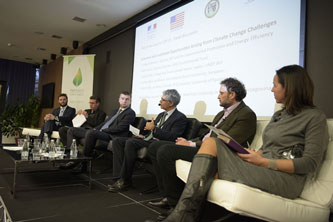 .
.
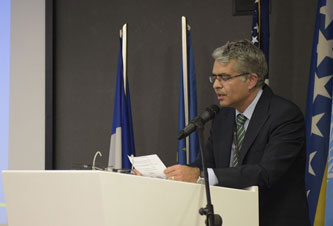
The panel; Dr. Laurent Mesbah
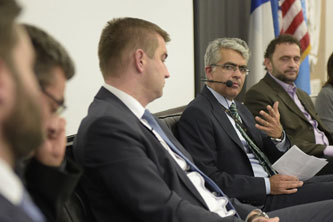
Dr. Mesbah moderating
Climate change and environmental experts, representatives of ministries, environmental protection funds, international and national organizations, universities and civil society organizations discussed the opportunities and challenges brought about by climate change in Bosnia and Herzegovina at the Conference. The opportunities for BiH include economic development in diverse sectors, such as the energy sector, including development of renewable energy sources: hydro and solar energy, wind energy and biomass energy, in order to thus reduce the use of coal and heavy industry.
The goal of the Paris Climate Conference COP21 that will be held from 30 November to 11 December is to adopt the global agreement, which will set the framework for the transition towards the societies and economies with low emission of carbon dioxide, who are willing to confront the climate changes. The future international agreement relates primarily to ensure equal reduction – the efforts to reduce greenhouse gas emissions – and the adaptation of societies to the forthcoming climate changes.
Source: American University in Bosnia and Herzegovina: http://aubih.edu/#idszt846bashfd24t7wefh8923fw95
Workshop on Sustainable Lifestyles and Education
Vienna, Austria, 20 November 2015
The Global Research Forum on Sustainable Production and Consumption (GRF-SPaC http://grf-spc.weebly.com/) and the Partnership for Education and research about Responsible Living (PERL http://www.livingresponsibly.org), both long-time partners of IEF, held a joint strategy workshop at the Vienna University of Economics and Business on 20 November 2015. The workshop was hosted by the Regional Centre of Expertise on Education for Sustainable Development Vienna (RCE Vienna) at the Institute for Ecological Economics, and was facilitated by Vanessa Timmer of One Earth and GRF-SPaC (see November Leaves). IEF was represented by Victoria Thoresen, PERL Coordinator, and Arthur Dahl.
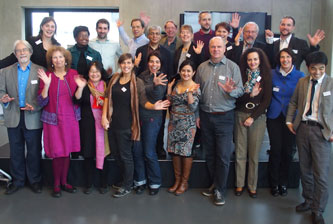
The topic of the workshop was the Sustainable Lifestyles and Education (SLE) program in the 10 Year Framework of Programmes on Sustainable Consumption and Production (10YFP) approved at Rio+20 and implemented by UNEP in collaboration with many partners. Two specific projects developed during the workshop were the "Transform" initiative piloted by PERL and "Mobilizing Research for Sustainable Lifestyles" (MORE-SL). These will collaborate closely with the SLE Flagship projects "Igniting Business Investments in Sustainable Lifestyles" (IBIS) and "Transitioning Cities". For more general information on 10YFP and SLE see: http://www.unep.org/10yfp/Programmes/ProgrammeConsultationandCurrentSta….
The workshop agreed to an action plan for activities on sustainable lifestyles and education over the next two years while detailed funding proposals are being developed. It also developed specific activities on education, cities, scenarios, and communications and framing. Values were acknowledged as an important component of the transformation in lifestyles called for in the SLE program and the UN 2030 Agenda.
Maurice Strong 1929-2015
Maurice Strong, on of the great leaders of the environmental movement in the 20th century, has just passed away. It is rare to find someone who is successful as a businessman, a diplomat and a visionary leader over such a long period of time.
I first saw Maurice Strong in action as Secretary-General of the United Nations Conference on the Human Environment in Stockholm in 1972, where I represented the Baha'i International Community. He then became the first Executive Director of the United Nations Environment Programme (UNEP). When I joined the South Pacific Commission as Regional Ecological Adviser in 1974, I traveled to Nairobi to establish cooperation with UNEP. Maurice was away at the time, so in December 1974 he came to New Caledonia to discuss how our two organizations could collaborate to advance environmental action in the Pacific. We spent three days together and I took him around the island to see some of the natural wonders we were trying to preserve. He said he did not want to stay too long at UNEP, as he preferred to create things rather than to manage them, and he wondered if he might come to live in the islands (as so many of us dream at one time or another). Based on our discussions, he gave a talk at the Pacific Science Congress in Vancouver in 1975 about the need for an environmental programme in the Pacific, and UNEP then supported me to build what became the Secretariat of the Pacific Regional Environment Programme (SPREP) now based in Apia, Samoa.
When Maurice was Secretary-General of the United Nations Conference on Environment and Development, the Rio Earth Summit of 1992, he asked UNEP to second me to his secretariat, specifically to prepare an islands section of Agenda 21, and I ended up doing the final drafting of the whole chapter 17 on oceans, coastal areas and islands.
Our paths did not cross too often after that, once when I was with UNEP and he visited our headquarters in Nairobi, and another occasion when by chance we sat next to each other in an airplane. He had a great appreciation for the Baha'is, and when my wife wanted to interview him for a film on Baha'u'llah that she was making for the Holy Year 1992 (Baha'u'llah, Secret of the Century), he agreed immediately to the interview.
At the United Nations Conference on Sustainable Development (Rio+20) in 2012, Maurice was on a panel to discuss the issues of employment and migration, and he made perhaps the most radical statement of any panelist when he said that we had to recognize that modern technology allowed us to meet our material needs will less and less labour, meaning that the economy would never create enough jobs for everyone, but this should not mean that anyone should be deprived of their share of the material benefits of the economy. That illustrated his perfect balance of an ethically-based idealism and practical realism.
This is my small tribute to one of my heroes and a great figure of the last half century.
Arthur Dahl
Felix Dodds has prepared hos own homage to Maurice Strong at http://blog.felixdodds.net/2015/11/rip-maurice-strong-father-of.html
Shared Vision, Shared Volition: Choosing Our Global Future Together
A statement of the Bahá'í International Community to the United Nations Climate Change Conference in Paris, France
Paris—23 November 2015
Anthropogenic climate change is not inevitable; humanity chooses its relationships with the natural world. This lies at the heart of the 2015 Paris Climate Conference (COP 21), the efforts of which are, in many ways, focused on identifying means by which better choices can be made. The current global order has often approached the natural world as a reservoir of material resources to be exploited. The grave consequences of this paradigm have become all too apparent, and more balanced relationships among the peoples of the world and the planet are clearly needed. The question today is how new patterns of action and interaction can best be established, both individually and collectively, through personal choices, social systems, and governing institutions.
With the adoption of the United Nations’ 2030 Agenda for Sustainable Development, including its social, economic and environmental dimensions, momentum for meaningful change has been building. A universal, legally binding agreement on carbon emissions seems within reach for the first time. Yet sustainability is defined as much by human and social factors as ecological ones. Correlation has been found, for example, between inequality and environmental degradation[1], suggesting that the relationships linking human beings with one another have a direct impact on the physical resources of the planet. The global systems that have left many facing poverty and want, have similarly impoverished the natural environment.
A more balanced attitude toward the environment must therefore address human conditions as consciously as it does natural ones. It must be embodied in social norms and patterns of action characterized by justice and equity. On this foundation can be built an evolving vision of our common future together. And that vision, in turn, stands as a powerful mechanism for mobilizing action around the world and coordinating numerous efforts into mutually-reinforcing lines of action.
Foundations for a New Consciousness
Setting humanity on a more sustainable path to the future involves transformation in attitudes and actions. Reform of institutional structures will be critical, and indeed this is a central focus of those gathered at COP 21. Yet ultimately it is people, whatever their role or place in society, who implement the policies of a central administration or ignore them, who participate in well-conceived programs or continue patterns of life as before. We all have agency and none of our decisions are without consequence. Establishing sustainable patterns of individual and collective life will therefore require not only new technologies, but also a new consciousness in human beings, including a new conception of ourselves and our place in the world.
From where will this consciousness arise? And where will the volition and self-discipline needed to embody it in countless cities, towns, and villages be found? Qualities such as the capacity to sacrifice for the well-being of the whole, to trust and be trustworthy, to find contentment, to give freely and generously to others derive not from mere pragmatism or political expediency. Rather they arise from the deepest sources of human inspiration and motivation. In this, faith has shown itself to be key, whether in the efficacy of sustainability efforts or the capacity of the human race.
Of particular note is the role to be played by religious faith. Religion has been a feature of human civilization since the dawn of recorded history, and has prompted countless multitudes to arise and exert themselves for the well-being of others. Religion offers an understanding of human existence and development that lifts the eye from the rocky path to the distant horizon. And when true to the spirit of its transcendent founders, religion has been one of the most powerful forces for the creation of new and beneficial patterns of individual and collective life.
Religion therefore offers a vital source of commitment to new and potentially challenging patterns of daily life. It is notable that religious leaders and faith-based organizations have been increasingly active on environmental and justice issues as they relate to climate change. But religious conviction does not automatically translate into service to the common good. It is entirely possible, for example, to have a congregation of well-intentioned adherents whose actions do little to contribute to the betterment of society. Clearly there is much to learn about how noble ideals become expressed in committed, sustained action. In this sense, religious communities can be understood as communities of practice in which spiritual teachings are translated into social reality. Within them, a process of capacity building that enables people of all backgrounds to participate in the transformation of society can be set in motion. How this unfolds in different contexts and cultures promises to be an area of rich exploration for all working on sustainability issues.
Identifying the spiritual principles at the root of ecological challenges can also be key in formulating effective action. Principles– that humanity constitutes but a single people, for example, or that justice demands universal participation in the work of sustainable development – reflect the rich complexity of human nature. Just as importantly, they help foster the will and the aspiration needed to facilitate the implementation of pragmatic measures. Identifying the principles underlying given issues and formulating action in light of their imperatives is therefore a methodology that all can benefit from and contribute to – those in traditionally religious roles, but also leaders of government, the corporate sector, civil society, and others involved in the formulation of public policy.
A Basis for Collective Action
Action on issues of sustainability is often grounded in the sentiment that we all live on the same planet. Of course shared concerns such as climate change, transnational migration, and global pandemics are not to be discounted. But truly transforming individual and collective patterns of life will require a much deeper appreciation of the interconnectedness of the planetary biosphere. People and the environment are inter-connected aspects of one organically integrated system. At this point in history, neither can be accurately understood in isolation from the other.
Implicit in this understanding is the organic oneness of the human race itself. Deceptively simple in popular discourse, the concept that humanity constitutes a single people has numerous implications for the formulation of effective action at all levels. COP 21, for example, can be understood as an opportunity to embrace more deeply the practical implications of the oneness of humanity, including the obligation to translate our moral responsibility toward one another and the natural world into tangible agreements, approaches, and plans of action.
A rich and deepening consciousness of the oneness of humankind is the only way that the obstacles inherent in dichotomies like rich/poor, north/south, developed/developing can be overcome. Designations of this kind are not without basis, for some countries do have more financial resources than others. But while such realities are not to be denied, neither should they be allowed to paralyze constructive action. Rather, they should be incorporated into the perspective that an integrated, sustainable and prosperous world will not be built by “us” working together with “them”, but by all of us working on behalf of everyone.
The principle of the oneness of humankind highlights the powerful connections found between raising the well-being of people and reversing environmental degradation. It is true that the ecological footprint of certain areas is far larger than that of others. This is a reality that will need to be addressed through both voluntary choice and governmental regulation. But equally important will be lifting billions out of poverty in ways that not only reduce harm to the environment, but actively improve it. Addressing social needs in the context of environmental ones responds to the pressing moral imperatives of climate change. But its rationale is highly pragmatic as well, for climate change calls for urgent action, and the dividends of such steps are greater the sooner they are taken.
Efforts of this kind also lay a foundation for valuing people and the planet as explicitly as profit has been. It is widely recognized today that the single-minded pursuit of financial gain has all too often led to the destruction of both natural systems and human lives. This legacy has left deep ambivalence about the role the corporate sector and market forces should play in sustainability efforts. Such questions are complex and not simply answered. But what seems imperative is that good faith efforts be integrated into a just global effort that avoids all forms of exclusion that breeds opposition, hostility, defensiveness, and distrust.
Recasting Relationships for a Sustainable Planet
The principle of the oneness of humankind has implications for relationships at all levels. Individual choices and governmental action are often subtly placed in opposition to one another, suggesting that one or the other either takes or deserves precedence. In reality, of course, both are needed. Agreements and protocols at the governmental level will not be sufficient if individuals do not adopt more sustainable lifestyles and behaviors. Similarly, individual actions alone, such as conserving water and reducing waste, for instance, will not be sufficient if governments do not make the necessary changes at the structural level. Also crucial is the community which, as a distinct unit of civilization with its own capacities and qualities, has a unique and vital role that cannot be overlooked. Increasing integration between these three levels will be needed, if long-lasting progress is to be achieved
What might this look like in practice? Consumption habits provide a helpful illustration. People might be open to recycling, for example, but live in areas without services such as drop-off centers or community composting. Without appropriate supports from government, then, possibilities for individual change are severely constrained. Institutional action to create an enabling environment is needed. Government has a vital role to enact the policies, laws, and regulations needed to support the desired actions and behaviors.
This framework, however, merely sets the stage. For ultimately it is individuals who take the initiative to adopt new patterns of action or continue with business as usual. Human behavior and personal decision-making are therefore critical to the success of sustainability efforts, particularly in the sphere of values, ethics, and morals. Such qualities might seem diffuse or somewhat “soft”, but changes in lifestyle will not be sustained if normative drivers of behaviors such as attitudes and beliefs do not shift as well. Consumption habits will not change if acquisition and the ongoing accumulation of luxury goods are seen as powerful symbols of success and importance. Building more sustainable patterns of life will therefore require continuing conversation about human nature and the prerequisites of well-being.
How do such conversations arise? Government can contribute, through educational outreach and efforts to build commitment among stakeholders. But the community has a vital role to play in allowing for dialogue about choices and behavior. Are municipal or provincial policies on water conservation welcomed as progress or treated as an unnecessary hassle? Are collective decisions about infrastructure informed by a shared vision of the future or do individuals mostly look out for themselves? The qualities of culture that inform questions such as these arise within the context of community. The community can provide an arena in which numerous participants, backgrounds, talents, and efforts combine to achieve change and progress. It also provides a key space in which consensus on shared goals and objectives can be reached and a common vision of the future built among a population. The growing list of cities taking far more robust action than their national governments on climate issues is just one example of the power inherent in a community that is able to pursue a common purpose through coordinated efforts.
Exploring new patterns of interaction among the actors of society, such as individuals and institutions, will be central to the task of building more sustainable relationships with the natural world and among various segments of the global family. The work of addressing global climate change ultimately revolves around the aim of human lives well lived, which is a goal cherished by people and cultures the world over. In it can therefore be found a powerful point of unity to support the work ahead. We trust that the efforts of those at COP 21 will contribute to building a firm foundation on which the well-being and prosperity of humanity can be ever more effectively pursued for this and future generations.
[1]See, for example, the 2011 Human Development Report: “A joint lens shows how environmental degradation intensifies inequality through adverse impacts on already disadvantaged people and how inequalities in human development amplify environmental degradation.” Also, Holland, T. G., Peterson, G. D., & Gonzalez, A. (2009). A Cross-National Analysis of How Economic Inequality Predicts Biodiversity Loss. Conservation Biology, 23(5), 1304-13013; Andrich, M. A., Imberger, J., & Oxburgh, E. R. (2010). Raising Utility and Lowering Risk through Adaptive Sustainability: Society and Wealth Inequity in Western Australia. Journal of Sustainable Development, 3(3), 14-35.
Source: https://www.bic.org/statements/shared-vision-shared-volition-choosing-o…
Updated 2 January 2016
|
